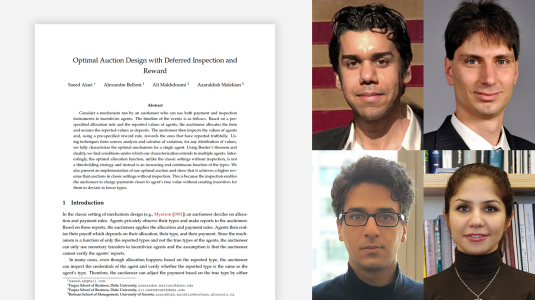-
2023 Conference on Digital Experimentation @ MIT (CODE@MIT)2023Randomized Control Trials (RCTs) are widely used across Amazon to causally estimate impacts of proposed feature changes, in order to make data-driven launch decisions. A key element of experimental design is the level of randomization, and the choice often relies on the cross-unit interaction structure. For instance, in the context of advertiser experiments, a treatment may affect the outcome of control
-
2023 Conference on Digital Experimentation @ MIT (CODE@MIT)2023There are many experimental settings that may suffer from cross-unit (customers, seller, advertiser, etc.) spillovers, for instance through network effects. Such effects introduce bias and prevent the experimenter from drawing trustworthy insights on the data. One approach to dealing with such spillovers is to group units into clusters and randomize treatment status at the cluster level. Examples of clusters
-
ESREL 20232023Enabling a circular economy aims to reduce the amount of global waste generated from electrical and electronic equipment, mitigate the associated risk to the ecosystem and human health, and address concerns over limited material resources. Durability is a critical concern because keeping products in use for a longer time should reduce resource consumption and waste. Assessing the durability of products
-
WINE 20232023Due to numerous applications in retail and (online) advertising the problem of assortment selection has been widely studied under many combinations of discrete choice models and feasibility constraints. In many situations, however, an assortment of products has to be constructed gradually and without accurate knowledge of all possible alternatives; in such cases, existing offline approaches become inapplicable
-
KDD 2023 Workshop on Causal Inference and Machine Learning in Practice: Use cases for Product, Brand, Policy and Beyond2023We introduce OpportunityFinder, a code-less framework for performing a variety of causal inference studies with panel data for non-expert users. In its current state, OpportunityFinder only requires users to provide raw observational data and a configuration file. A pipeline is then triggered that inspects/processes data, chooses the suitable algorithm(s) to execute the causal study. It returns the causal
Related content
-
June 23, 2022Two-day RecSys workshop that extends the popular REVEAL to include CONSEQUENCES features Amazon organizers, speakers.
-
May 16, 2022Matt Taddy, vice president of Amazon’s Private Brands business, is the coauthor of Modern Business Analytics: Practical Data Science for Decision Making, a primer for those who want to gain the skills to use data science to help make decisions in business and beyond.
-
March 22, 2022Amazon Scholar Alexandre Belloni discusses the implications of auction design on digital goods.
-
January 7, 2022Amazon Scholar David Card and Amazon academic research consultant Guido Imbens talk about the past and future of empirical economics.
-
December 13, 2021Amazon Research Award recipient Éva Tardos studies complex theoretical questions that have far-ranging practical consequences.
-
November 17, 2021The paper by Özer and his co-authors examines the role of earmarking and transparency on donors and their donations.







